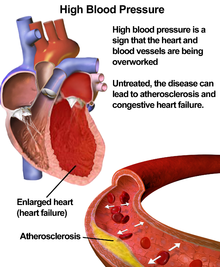Hypertension
Jump to navigation
Jump to search

Hypertension (HTN or HT), also called high blood pressure (HBP), is a chronic state of resting systolic/diastolic blood pressure exceeding (for adults) the range of about 130/80 or 140/90 mm of mercury. Hypertension increases the risk of heart disease, stroke, transient ischemic attack, vision loss, and kidney disease.
| This science article is a stub. You can help Wikiquote by expanding it. |
Quotes[edit]
- Elevated blood pressure (BP) remains an extraordinarily common and important risk factor for cardiovascular and renal diseases, including stroke, coronary heart disease, heart failure, and kidney failure. According to the most recent NHANES survey (1999 to 2000), 27% of adult Americans have hypertension (systolic BP ≥140 mm Hg, diastolic BP ≥90 mm Hg, or use of antihypertensive medication), and another 31% have prehypertension (systolic BP of 120 to 139 mm Hg or diastolic BP of 80 to 89 mm Hg, not on medication). ... Prehypertensive individuals have a high probability of developing hypertension and carry an excess risk of cardiovascular disease as compared with those with a normal BP (systolic BP <120 mm Hg and diastolic BP <80 mm Hg). ... It has been estimated that among adults >50 years of age, the lifetime risk of developing hypertension approaches 90%. ...
- Lawrence J. Appel, Michael W. Brands, Stephen R. Daniels, Njeri Karanja, Patricia J. Elmer, and Frank M. Sacks: (February 2006)"Dietary approaches to prevent and treat hypertension: a scientific statement from the American Heart Association". Hypertension 47 (2): 296–308. DOI:10.1161/01.HYP.0000202568.01167.B6.
- In this systematic review and meta-analysis, including 74 trials and more than 300 000 patients, treatment to lower blood pressure was associated with a reduced risk for death and cardiovascular disease if baseline systolic blood pressure was 140 mm Hg or above. Below 140 mm Hg, the treatment effect was neutral in primary preventive trials, but with possible benefit on nonfatal cardiovascular events in trials of patients with coronary heart disease. ...
High blood pressure (BP) is the most important risk factor for death and cardiovascular disease (CVD) worldwide. The optimal cutoff for treatment of high BP is debated.- Mattias Brunström and Bo Carlberg: (2018). "Association of blood pressure lowering with mortality and cardiovascular disease across blood pressure levels: a systematic review and meta-analysis". JAMA Internal Medicine 178 (1): 28-36.
- Abnormal sodium metabolism may be critical in the causation of certain forms of hypertension, particularly salt-sensitive hypertension. Long-term restriction of sodium intake in patients at high risk for the development of hypertension may reduce the chances of established hypertension occurring later. These high-risk patients in whom subsequent hypertension may be prevented include normotensive patients with family histories of hypertension, elderly patients, black patients, and those with low-renin hypertension. Treatment of hypertension with moderate sodium restriction to 70 mEq/day will significantly reduce blood pressure in a large percentage of patients, particularly known salt-sensitive hypertensive patients. This degree of restriction is also an effective adjunctive therapy for patients receiving antihypertensive medications. There is convincing experimental, epidemiologic, and clinical evidence that moderate sodium restriction helps prevent and assists in the treatment of hypertension in those patients who are genetically predisposed to develop primary hypertension or who already have hypertension. There is no evidence that this degree of sodium restriction is harmful.
- Mark C. Houston: (January 1986)"Sodium and hypertension. A review". Archives of Internal Medicine 146 (1): 179–85. DOI:10.1001/archinte.1986.00360130217028.
- The effect of induced hypertension on the blood-brain barrier (BBB) change in Mongolian gerbils exposed to various periods of ischemia was studied. Evans blue dye was used to determine the BBB change in animals subjected to different levels of hypertension after 3 h ischemia. Horseradish peroxidase (HRP) was used in electronmicroscopic studies of animals subjected to 30 min, 1, 3 or 6 h ischemia and subsequently exposed for 30 min to varying periods and sequences of normo- and hypertension. Furthermore, HRP-labeled vesicle counts were performed in animals from the 30-min ischemia group. Our findings revealed that hypertension, after blood flow restoration following ischemia, induces and/or accelerates BBB damage by enhancing endothelial vesicular and/or tubulo-channel transport.
- Umeo Ito, Kikuo Ohno, Takekane Yamaguchi, Hidenori Takei, Hiroki Tomita, and Yutaka Inaba: "Effect of hypertension on blood-brain barrier. Change after restoration of blood flow in post-ischemic gerbil brains. An electronmicroscopic study." Stroke 11, no. 6 (1980): 606-611.https://www.ahajournals.org/doi/abs/10.1161/01.STR.11.6.606
- The importance of white coat hypertension rests on a curious haemodynamic phenomenon, which has quite profound clinical relevance: patients—let us call them people, because they may not be ill—who appear to have hypertension when their blood pressure is measured by the traditional Riva-Rocci/KorotkoV method, have normal blood pressures when ambulatory techniques are used to record their blood pressures away from the medical environment. Put another way, conventional blood pressure measurement is misleading in people with white coat hypertension (and most of us have some degree of white coat reaction), and if decisions are based on these measurements inappropriate diagnosis and treatment may result.
- Eoin O'Brien: (January 2001)"Blood pressure measurement is changing!". Heart 85 (1): 3–5. DOI:10.1136/heart.85.1.3. (quote from p. 3)

